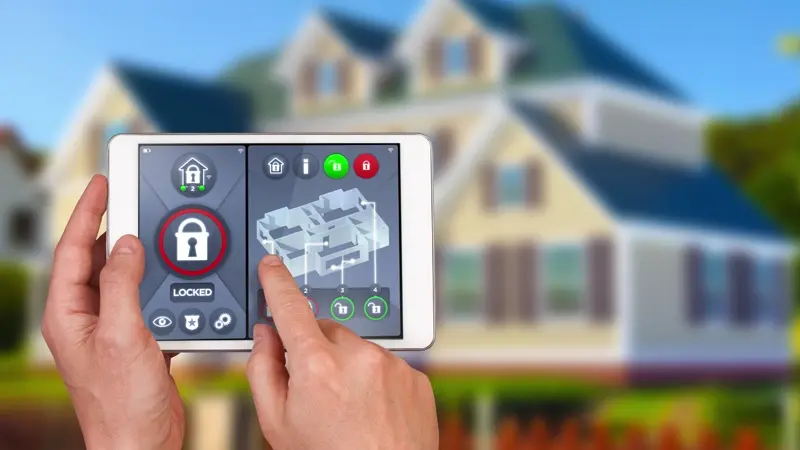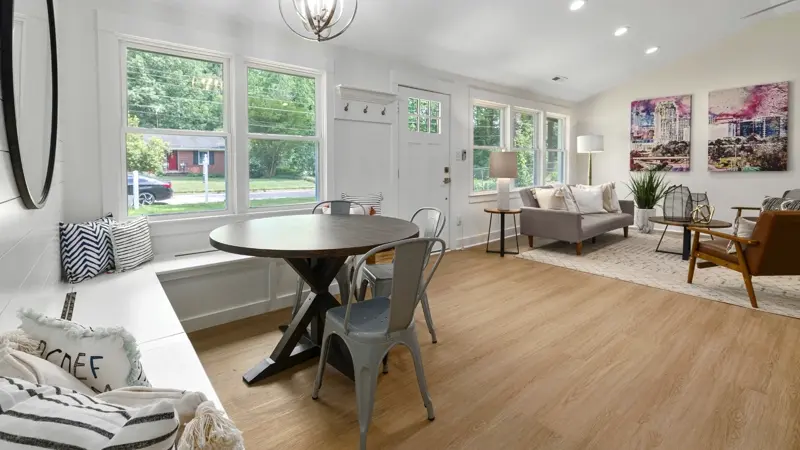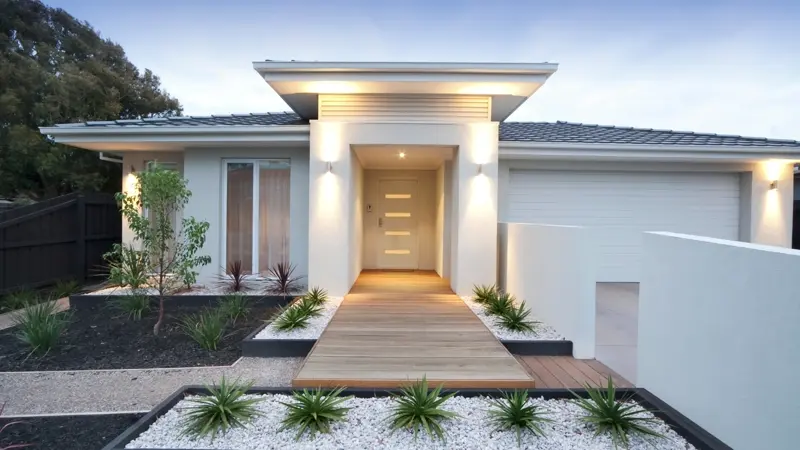In today’s digital era, home security has advanced past the conventional lock and key approach. Smart door locks integrate ease of use with modern technology, rendering traditional keys obsolete. As there are various models to consider, it’s essential to be informed about your choices before you enhance your home’s security. The following is a detailed guide that explores the different smart door lock options available in the market and helps you comprehend their respective advantages and disadvantages.
Table of Contents
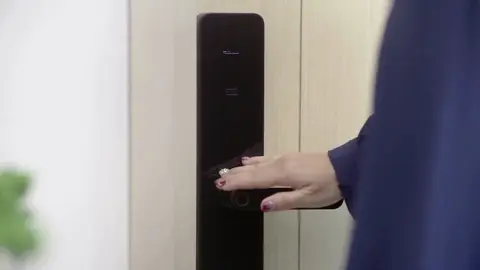
Understanding the Various Smart Door Lock Models
Smart door locks represent a leap forward in home security by enhancing traditional lock functions with advanced technology for increased convenience and capabilities. These locks provide the same key objective as conventional locks—securing our homes—but do so with modern features that cater to a variety of needs. With multiple smart lock options available, it’s important to grasp their differences to choose one that meets your specific security needs and fits into your lifestyle seamlessly.
1. Keypad and Pin Code Smart Locks
Smart keypad locks represent a significant step forward in home security, thanks to their combination of keypads and advanced technology. These aren’t your average locks; they’re an integrated part of a secure, smart home system. Users enter a pin code on a touchscreen to unlock their doors, turning the home into a secure digital space. Homeowners have the ability to assign specific pin codes to different people, allowing for controlled access at varying levels – each person can enter the home at designated times without jeopardizing security.
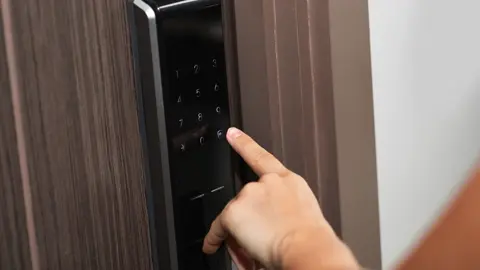
Smart locks are also flexible enough to handle temporary access for guests or workers, keeping security intact. They often include features such as one-time code generation, which is perfect for temporary rentals like Airbnb. Furthermore, many smart locks automatically lock the door after it’s been opened and closed, adding an extra layer of protection by ensuring your door is never accidentally left unlocked. This blend of ease of use with robust security measures is what distinguishes smart keypad locks as a leading home safety solution.
2. Biometric Fingerprint Readers
Biometric fingerprint readers are at the forefront of security technology, skillfully blending ease of use with the high security offered by the unique patterns of human fingerprints. These devices quickly and accurately capture a person’s fingerprint details, such as ridges and contours, turning this biometric data into a secure digital key for personal access. Given that no two fingerprints are alike and they cannot be duplicated, these readers provide superior security by negating concerns about key theft or loss. They are also designed to be user-friendly; they can store multiple fingerprints, allowing each household member to access the space with a simple touch.
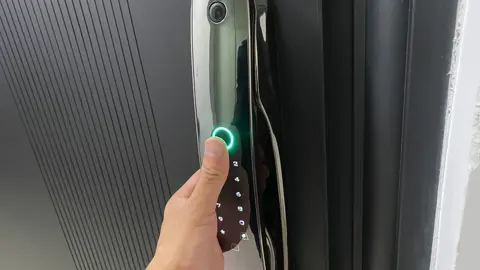
Additionally, biometric locks are known for their easy installation and manageable maintenance, including the ability to update or delete fingerprint data as needed. Whether used in a private home or a strictly controlled commercial area, biometric fingerprint readers are reshaping secure access by combining strong security measures with convenient operation to offer an optimal locking solution.
3. Bluetooth Smart Locks
Bluetooth smart locks mark a significant advancement in both home security and convenience. By harnessing Bluetooth technology, these locks communicate with an app on your smartphone, effectively turning your phone into a key. The integration is smooth, enabling you to unlock your door without touching it as the lock detects the distinct signal from your phone when you’re close by. This offers a huge advantage by eliminating the need for physical keys, which are often lost or stolen, thereby enhancing security and convenience for homeowners.
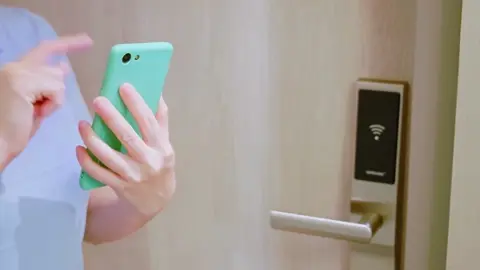
Yet, users should note that the convenience offered by these smart locks is limited by their operational range; they only work when your smartphone is within a short distance, typically a few feet from the lock. Despite this limitation, many find that the advantages of increased security and state-of-the-art technology outweigh these concerns, making Bluetooth smart locks a valuable addition to modern homes.
4. Wi-Fi Connected Locks
Wi-Fi connected locks significantly enhance home security and user convenience by modernizing the age-old key-and-lock mechanism with wireless technology. These advanced locks enable you to secure or grant access to your home remotely from anywhere in the world, as long as you’re connected to the internet. This means you can open your door for visitors or service providers even when you’re away at work, or you can double-check that your house is locked while on vacation. Adding to the convenience, smart locks send real-time notifications to alert you whenever someone enters or leaves your property, offering an extra measure of security and peace of mind.
The interfaces of these locks are designed for ease of use, letting you assign and customize access codes for various people, with flexibility in setting both temporary and permanent permissions. However, it’s important to remember that the effectiveness of Wi-Fi connected locks depends on a continuous power source and stable internet connection. In case these are unavailable, the functionalities could be compromised, though many smart locks include alternative methods for operation during such instances.
5. RFID Card/Fob Enabled Locks
In today’s world, where we prioritize both convenience and security, locks that are enabled by RFID (Radio-Frequency Identification) cards or fobs are becoming popular. These advanced locks are increasingly used in settings such as hotels and corporate buildings, displacing the traditional metal key with a more efficient method of access. By simply swiping or tapping a card or fob against the lock, users can open doors without the need for physical keys, which can be easily lost, or having to remember a code.
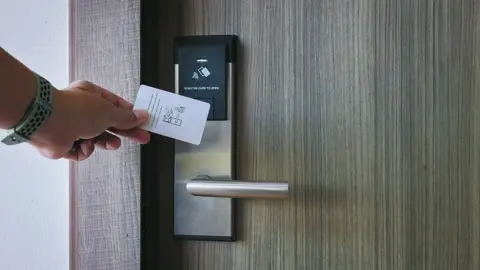
Not only is RFID technology convenient for entering secured areas, but it also revolutionizes how we control who can access these areas. The systems allow for customizable entry permissions and keep detailed records of who has entered a space and when. As such, RFID-enabled locks act as guardians of modern living spaces, ensuring entry is not just allowed but carefully controlled and monitored.
Pros of Smart Door Locks:
- Enhanced Convenience: Eliminate the hassle of keys with a smart door lock that opens with your smartphone, voice, or fingerprint. Granting access to visitors or workers is simplified without the need for extra keys.
- Improved Security: Built-in alarms and notifications alert you to tampering or an ajar door, while advanced technology restricts entry to authorized individuals only.
- Remote Access: Lock your door from anywhere if you forget on your way out. Monitor and control your lock status from afar, providing homeowners with significant peace of mind.
- Customizable Options: Personalize your security with user-specific codes, permissions for limited access, and tracking of entries and exits for added safeguarding.
Cons of Smart Door Locks:
- Reliability Concerns: Dependency on electricity and internet mean smart locks can falter when there’s a power failure or network issues, potentially barring entry.
- Risk of Hacking: As internet-connected devices, smart locks face hacking risks despite ongoing improvements in security by manufacturers.
- Higher Expense: The up-front investment for a smart lock surpasses that of traditional locks, as might the costs for installation and continued maintenance.
- Complexity Challenges: Those less familiar with technology may find setup and routine management of smart locks complicated or bothersome.
About smart door locks
Smart locks with Z-Wave technology are designed for integration into home automation systems, allowing devices to communicate and enabling features like scheduled lock operations or connections with other home devices such as lighting or alarms. Additionally, there are multifunctional smart locks that offer multiple entry options, including keypads and biometric scans, to allow numerous users access and provide backup if one entry method fails.
The design of smart locks varies widely to satisfy different tastes and door types. Some are made to replace just the inside part of a lock, leaving the exterior unchanged; others replace both sides, come with deadbolts, or are crafted to add smart features onto existing deadbolts without the need for full hardware replacement.
Regarding security—of equal importance for both smart and traditional locks—consumers should consider encryption standards that protect data and consider models with alarms that notify owners of possible tampering attempts.
Installation requirements differ across smart locks, some necessitating professional services while others boast easy-to-install processes. Since they’re battery-operated, battery life is a concern; it is worth considering models with low battery warnings or backup unlocking methods in case of power loss.
Privacy is another critical aspect due to the potential tracking of usage patterns. Users should be aware that their locking data might be vulnerable to hacking or legal inquiries based on regional legislation.
When choosing a smart lock, consumers must balance convenience with security, and aesthetics with practicality. Thankfully, ongoing innovation in this area promises enhanced security through advanced encryption and improved compatibility with home automation systems.
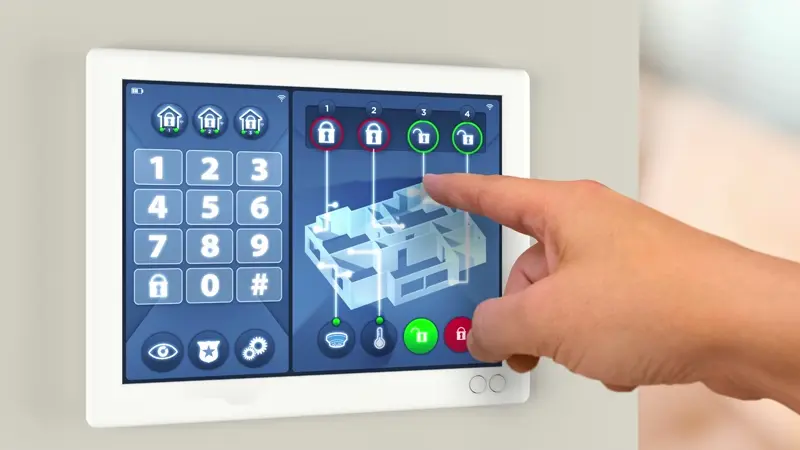
The Bottom Line
In this age where connectivity and immediate control through our fingertips are the norms, smart door locks suggest a future where traditional keys might be obsolete. There’s a suitable option for everyone among the wide range of available models.
Selecting a smart door lock is a personal choice that hinges on your preferences, budget, and the specific features you’re looking for. To enhance security and convenience in your daily life, it’s worthwhile to consider these advanced security devices for your home.
